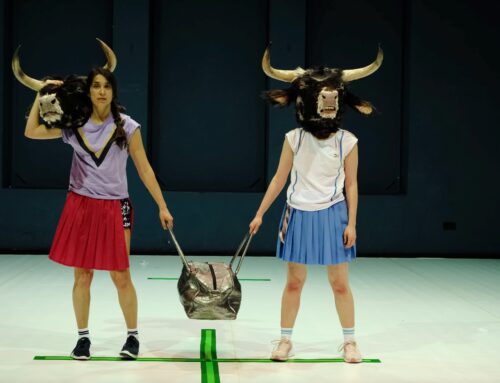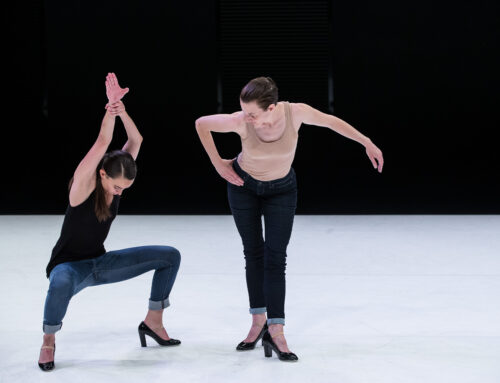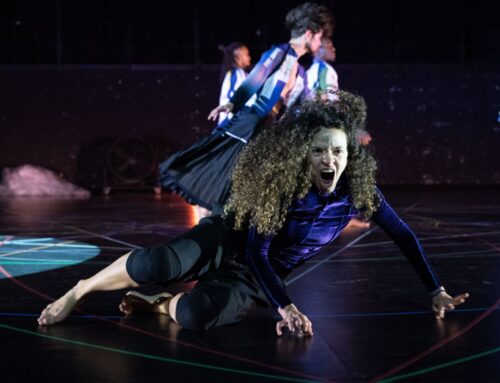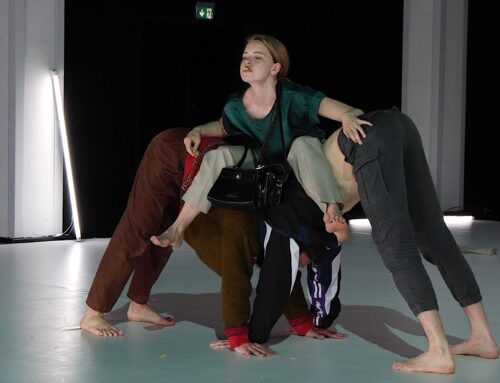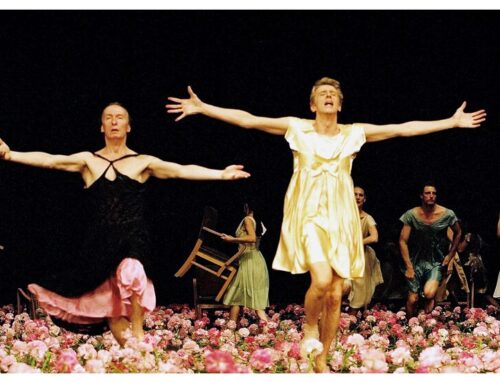Le Sacre du printemps von Pina Bausch mit afrikanischen Tänzern
Überaus spannendes Projekt: Die Pina Bausch Foundation und die École des Sables geben Zusammenarbeit bekannt.
In 2019 starten die Pina Bausch Foundation (Wuppertal, Deutschland) und die École des Sables (Toubab Dialaw, Senegal) ein einzigartiges Austauschprojekt, bei dem sie ihr kreatives Umfeld miteinander teilen und ihre Gemeinsamkeiten erkunden. Diese erste Zusammenarbeit besteht aus zwei Komponenten.
Zum einen werden Tänzer*innen, mit einer Ausbildung in afrikanischen Tänzen Le Sacre du printemps von Pina Bausch einstudieren. Eine Workshop-Tour mit Stationen in Burkina Faso, dem Senegal und der Elfenbeinküste, soll eine möglichst breite Tanzgemeinschaft zusammenbringen und dient gleichzeitig als Casting-Format, um potenzielle Teilnehmer*innen zu finden. Ehemalige und gegenwärtige Tänzer*innen des Tanztheater Wuppertal Pina Bausch werden auf ihre gesammelten Erfahrungen zurückgreifen und in der Funktion von Probeleiter*innen die Choreografie an die neuen Tänzer*innen weitergeben.
Zum anderen wird im Rahmen der Zusammenarbeit eine völlig neue Kreation entstehen. Germaine Acogny, Gründerin der École des Sables, und ein ehemaliges Ensemblemitglied des Tanztheater Wuppertal werden gemeinsam ein neues Duett choreografieren und aufführen. Beide Künstler*innen werden zusammen ihr tänzerisches Erbe erforschen, ihre Erfahrungen teilen und diese in ihre neue Kreation einfließen lassen.
Das Projekt geht auf zahlreiche Berührungspunkte der beiden Institutionen in den vergangenen Jahren zurück, welche bei beiden den Wunsch nach einem gemeinsamen Projekt anregten. Im Hinblick auf das 10-jährige Jubiläum der Pina Bausch Foundation im kommenden Jahr, haben die positiven Erfahrungen aus vergangenen Weitergabe-Projekten die Foundation dazu angeregt, neue Ansätze für zukünftige Weitergaben zu konzipieren.
Dabei stehen die wechselseitigen Einflüsse zwischen Tänzer*innen und Choreografien im Vordergrund: Erfahrungen, die Tänzer*innen beim Tanzen einer Choreografie sammeln und Spuren, die die Tänzer*innen in einem Stück hinterlassen. Vor diesem Hintergrund haben sich die Projektpartner gemeinsam für die Weitergabe von Pina Bauschs Choreografie zu Igor Strawinskys Le Sacre du printemps entschieden. Der gegenseitige Austausch wird zum grundlegenden Element der Zusammenarbeit.
Der Doppelabend wird im Frühjahr 2020 im klassischen Théâtre National Daniel Sorano (Dakar, Senegal) uraufgeführt werden, gefolgt von Freiluftaufführungen im Centre Culturel Blaise Senghor (Dakar, Senegal) und der finalen Aufführung der ersten Tour-Phase im Opernhaus Wuppertal. Weitere Touren in Afrika und Europa werden gemeinsam mit dem Sadler’s Wells (London, Vereinigtes Königreich) geplant. Das Théâtre de la Ville (Paris, Frankreich) wird bei diesem Projekt ein besonderer Partner sein. Beide, Sadler’s Wells und das Théâtre de la Ville, pflegen seit Jahrzehnten enge Beziehungen zu Pina Bausch und dem Tanztheater Wuppertal.
Dieses Projekt ist eine Gemeinschaftsproduktion zwischen der École des Sables, der Pina Bausch Foundation und dem Sadler’s Wells. Es wird von der Kulturstiftung des Bundes und dem Ministerium für Kultur und Wissenschaft des Landes Nordrhein-Westfalen gefördert. Unterstützt wird dieses Projekt ebenfalls durch das Tanztheater Wuppertal Pina Bausch. Weitere Finanzierungspartner werden zu einem späteren Zeitpunkt bestätigt.
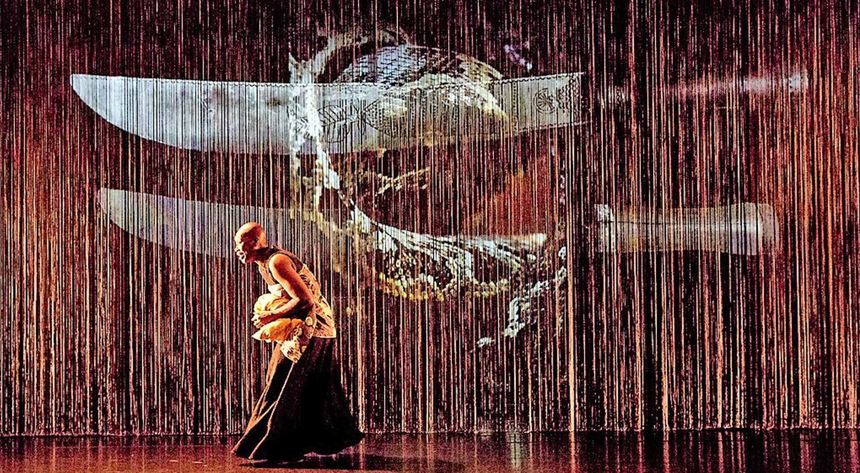
©Thomas Dorn – Germaine Acogny
APPENDIX
Project Partners Common Ground[s].
École des Sables, Senegal
L’Ecole des Sables, an INTERNATIONAL CENTRE FOR TRADITIONAL AND CONTEMPORARY AFRICAN DANCES, is also a school for theoretical and practical teaching, a laboratory for research, and a space for meetings and exchanges, conferences and artistic residences.
The School is dedicated to professional training for dancers from all over Africa in traditional and contemporary African dances. Its objectives are to professionalize African dancers, allow them to be able to live from their art, encourage communication and collaboration between dancers, choreographers and companies from Africa and with the rest of the world; in short, to develop and promote contemporary African dance.
Since 1998, school regularly organizes professional training workshops gathering dancers and choreographers from Africa, the African Diaspora and all over the world. It was created in 1998 by Germaine Acogny, considered as the Mother of Contemporary African Dance, and her husband Helmut Vogt. Germaine Acogny, former director of Mudra Afrique (1977-1982), a panafrican school founded by Leopold Sedar Senghor and Maurice Bejart, with the objective to give a professional education to African dancers and citizens to make them become responsible and autonomous through the art.
ecoledessables.org
Pina Bausch Foundation, Germany
The Pina Bausch Foundation was established in 2009 shortly after the death of Pina Bausch by her son Salomon Bausch. The charitable foundation based in Wuppertal owns the rights to the works and choreographies of Pina Bausch along with the set and costume designs of Rolf Borzik and the extensive Pina Bausch archive. The foundation’s role is to carry Pina Bausch’s oeuvre forward into the future, to disseminate it and enable its performance.
Preserving a work of choreographic art requires much more ongoing work than most other forms, as no sooner is it realised, it is gone again, and must be brought back to life on stage again with each performance.
The Pina Bausch Archive, which consists first and foremost of production details and documentation, serves as a knowledge resource. This resource, combined with the unique knowledge of the Tanztheater Wuppertal ensemble, is the basis for the continued performance of the pieces. For this process, it is not only important to pass on the knowledge continually to new dancers, but also to train people to pass this knowledge on.
In recent years, dancers took on the role of stagers, transmitting choreographies directly to dancers within and outside the Tanztheater Wuppertal. Thus, pieces have been rehearsed with companies such as the Bavarian State Ballet, the English National Ballet, the Opera Ballet Vlaanderen and the Paris Opera. The positive experiences from these transmission projects encouraged the Pina Bausch Foundation to mark its 10th anniversary by looking to the future and searching for new forms and objectives for the transferal of Pina Bausch’s works, thus widening access to them, under the heading ‘Reimagining Transmission’.

germaine acogny @Thomas Dorn
Sadler’s Wells Theatre, United Kingdom
Sadler’s Wells is a world-leading creative organisation dedicated to dance in all its forms.
With over three centuries of theatrical heritage and a year-round programme of performances and learning activities, it is the place where artists come together to create dance, and where people of all backgrounds come to experience it – to take part, learn, experiment and be inspired.
Audiences of over half a million come to its London theatres each year, with many more enjoying its touring productions at venues across the UK and around the world, and accessing its content through digital channels. Sadler’s Wells commissions, produces and presents more new dance work than any other theatre in the world, embracing the popular and the unknown. Since 2005, it has helped to bring over 160 new dance works to the stage, many of them involving its 16 Associate Artists, three Resident Companies and four Associate Companies – the most exciting talents working in dance today.
It also nurtures the next generation of talent through research and development, running the National Youth Dance Company and a range of programmes including Wild Card, New Wave Associates, Open Art Surgery and Summer University. Sadler’s Wells‘ learning and engagement activities reach over 25,000 annually through programmes that take dance out into the community and invite communities into the theatre. Projects include community productions and the renowned Company of Elders, its resident over-60s performance group, while events range from pre and post-show talks with dance artists to classes, workshops and assisted performances.
Located in Islington, north London, the current building is the sixth to have stood on site since entrepreneur Richard Sadler first established the theatre in 1683. The venue has played an illustrious role in the history of theatre ever since, with The Royal Ballet, Birmingham Royal Ballet and English National Opera having all started at Sadler’s Wells.
sadlerswells.com

germaine acogny @Thomas Dorn

